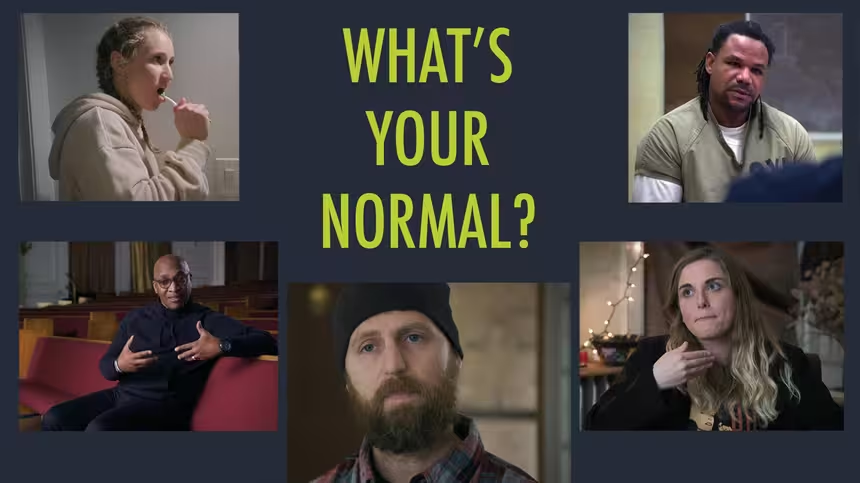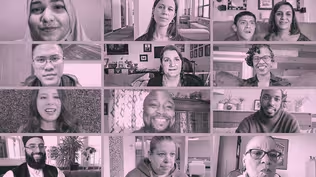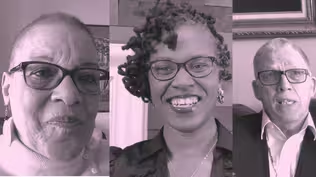
Adriana Alejandre | Decolonizing Mental Health
Special | 4m 17sVideo has Closed Captions
Adriana Alejandre decides to change the way the Latinx community views mental healthcare.
“We fix problems inside the family” is what Adriana Alejandre grew up hearing. Determined to change the way the Latinx community approached mental healthcare, she started her practice as a bilingual therapist in LA. Overwhelmed by the number of patients she had to turn down, Alejandre started the Latinx Therapy podcast, which has become an important mental healthcare resource for the community.
Problems playing video? | Closed Captioning Feedback
Problems playing video? | Closed Captioning Feedback
Funding for Mysteries of Mental Illness is provided by the Corporation for Public Broadcasting, Johnson & Johnson, the American Psychiatric Association Foundation, and Draper, and through the support of PBS...

Adriana Alejandre | Decolonizing Mental Health
Special | 4m 17sVideo has Closed Captions
“We fix problems inside the family” is what Adriana Alejandre grew up hearing. Determined to change the way the Latinx community approached mental healthcare, she started her practice as a bilingual therapist in LA. Overwhelmed by the number of patients she had to turn down, Alejandre started the Latinx Therapy podcast, which has become an important mental healthcare resource for the community.
Problems playing video? | Closed Captioning Feedback
How to Watch Mysteries of Mental Illness
Mysteries of Mental Illness is available to stream on pbs.org and the free PBS App, available on iPhone, Apple TV, Android TV, Android smartphones, Amazon Fire TV, Amazon Fire Tablet, Roku, Samsung Smart TV, and Vizio.

Join the Campaign
Share your story of dealing with mental illness through textual commentary, a still image, a short-form video — however you feel most comfortable — using the hashtag #MentalHealthPBS on social media.(gentle music) - My name is Adriana Alejandre.
I was born and raised in Burbank, California to a Mexican father and a Guatemalan mother, that naturally came with a lot of strictness.
They were very traditional, and so I was very, very limited with what I could do.
I would describe my mom more so as emotionally distant.
My mom didn't allow us to have emotional access to my father.
My Guatemalan lineage does have a lot of intergenerational trauma.
And I think that I grew up with a lot of that, a lot of unspoken mental health concerns and issues, and it manifested in a lot of fear.
After graduating high school and right as I was entering UC Santa Barbara, I met someone.
He became my first official boyfriend as an adult.
Unfortunately, things didn't end well.
I did end up pregnant.
And from the moment that I became pregnant, I knew that I was gonna become a single teen mom at that point.
The isolation that I felt while I was pregnant was very dark.
It was very lonely.
It was filled with a lot of depression.
I remember going to office hours and the professor was a clinical psychologist.
He asked me what my story was, why I was sad because he felt some sort of sadness coming from me.
And he suggested that I go talk to somebody.
And it was at that time when I was just like I know that therapy exists, but I didn't think that it could be for someone like me, someone that grew up poor, someone that grew up with immigrant parents.
During the first few sessions, I remembered my mom's voice.
And she told me when I was pregnant that we don't share our problems to anybody else.
And so, at that time, I realized I can't be in therapy, this feels wrong.
It wasn't until I became a mother when I was able to recognize there's a lot of cycles being repeated here.
That was really what led me into the field of psychology.
I became so curious of my own human behaviors and I wanted to be someone that could help people like me in the future.
I entered therapy close to the start of my graduate program and I loved it.
I had a positive experience and I didn't feel like I was silenced anymore by my family, my parents specifically.
I just felt like I could make my own choices.
Within my first year of being licensed, in terms of my caseload, I didn't have any more capacity to accept others.
And I learned that it was because I was the only Latina bilingual trauma EMDR specialized therapist within that area.
And I was frustrated because I didn't think that my community should have to wait for treatment.
As a therapist of color within the field has allowed me to take action in my own way within my own limited capacity.
I created Latinex Therapy the podcast Bilingually, and the Latinex Therapy Directory.
I wanted a hub of Latinex therapists to be able to connect, come together and network, get to know one another and create more community.
Multiple systems have failed us, have failed many communities of color.
We are doing the very, very best that we can given the tools, the limited tools that we got.
At this point, we are not willing to wait any longer.

- Science and Nature

Explore scientific discoveries on television's most acclaimed science documentary series.

- Science and Nature

Capturing the splendor of the natural world, from the African plains to the Antarctic ice.












Support for PBS provided by:
Funding for Mysteries of Mental Illness is provided by the Corporation for Public Broadcasting, Johnson & Johnson, the American Psychiatric Association Foundation, and Draper, and through the support of PBS...

